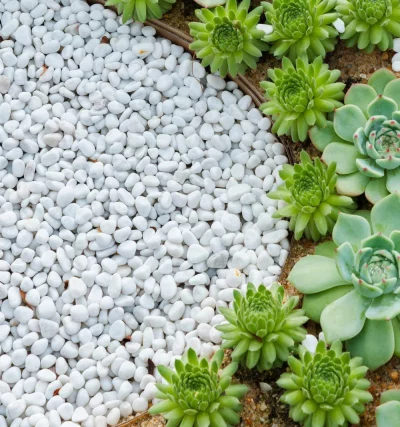Alternatives to Traditional Mulch

Mulch provides nutrients to soil and plants, reduces weed growth, controls soil temperature, and improves the look of lawns and gardens. Though bark and wood chips are typically the most common mulch variety, there are other forms that are just as beneficial. We compare seven alternatives to traditional mulch and help you determine which is best for your lawn and garden.
1. Bark and Wood Chips
Frequently used on flower beds and around small bushes and shrubs, bark and wood chips are known to provide nutrients to the soil as they decay. Both are fairly inexpensive and can be found at most gardening supply stores. Cedarwood chips are the most common, as they’re known to keep fleas and other pests away.
2. Pebbles and Rocks
Effective in retaining soil moisture and minimizing weed growth, pebbles and rocks are an excellent mulch alternative for flower beds. Rocks are especially economical in cooler climates, where heat retained by rock mulch can extend the growing season.
Because rocks don’t decompose, they don’t provide nutrients to the soil and therefore aren’t a good choice if you’re looking for a nutrient-rich mulch alternative. This is easily remedied by fertilizing your lawn to the soil to give your plants and flowers more nutrients. If you decide to use pebbles or rocks, know that they can be difficult to remove if you decide to switch to a different type of mulch a season or two down the line.
3. Leaves and Pine Needles
Leaves and pine needles are an affordable nutrient-rich mulch alternative. Rake and gather fallen leaves each season and redistribute them above your soil. Shred leaves for the best results. Let the shredded leaves dry out before adding them to your garden to reduce bacteria growth and pest infestations.
Pine needles decompose and add nutrients to the soil, just like other organic forms of mulch. You can buy bundles of pine needles at your local gardening store or you can gather pine needles from your annual holiday tree and spread them around your garden. They work best with plants like holly gardenias, roses, and chrysanthemums.
4. Grass Clippings
Grass clippings are a cost-efficient alternative to traditional mulch. However, they need to be dried out or composted before use to prevent potentially-damaging heat from affecting plants. If you treat your lawn with chemicals, don’t use grass clippings in your flower or garden bed.
5. Rubber Mulch
Some people use a rubber mulch alternative to reduce fungus and weed growth and insulate soil from hot and cold temperatures. Rubber mulch is made of 100% recycled rubber, usually from reclaimed tires. As you would expect, rubber mulch is similar to rock mulch and doesn’t provide nutrients to the soil. It can also leach small amounts of chemicals into the soil, which can be harmful to some plants.
However, rubber mulch lasts significantly longer than wood mulch and cuts down on the use of trees and other organic mulch material.
6. Compost
If you’ve been wondering what home composting entails, compost enriches the soil, adding nutrients such as phosphorus, potassium, and nitrogen to your garden. It’s one of the cheapest mulch alternatives if you make it yourself with discarded vegetable scraps, coffee grounds, dead leaves, and water. Apply compost above your garden or lawn in a thin layer.
7. Newspaper
Newspaper is effective in keeping weeds at bay, retaining moisture, and regulating soil temperatures. Though this is a more functional alternative to traditional mulch, it’s not as visually appealing as other options. Moisten the newspaper slightly before laying it above the soil so that it stays in place. Then, add a thin layer of organic mulch on top. Apply five to eight sheets of newspaper at a time.
If you plan to use newspaper without another type of mulch on top, you’ll want to shred it before applying it to your garden. Newspaper is biodegradable and will deteriorate like other mulches.
See more at…https://todayshomeowner.com/lawn-garden/guides/alternatives-to-traditional-mulch/